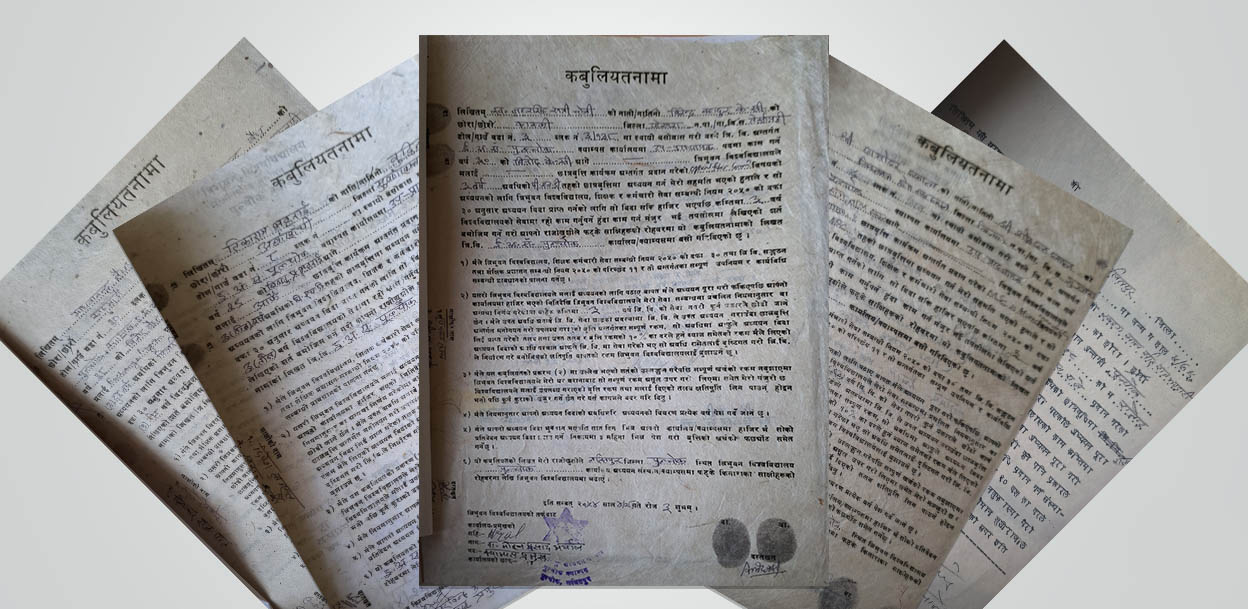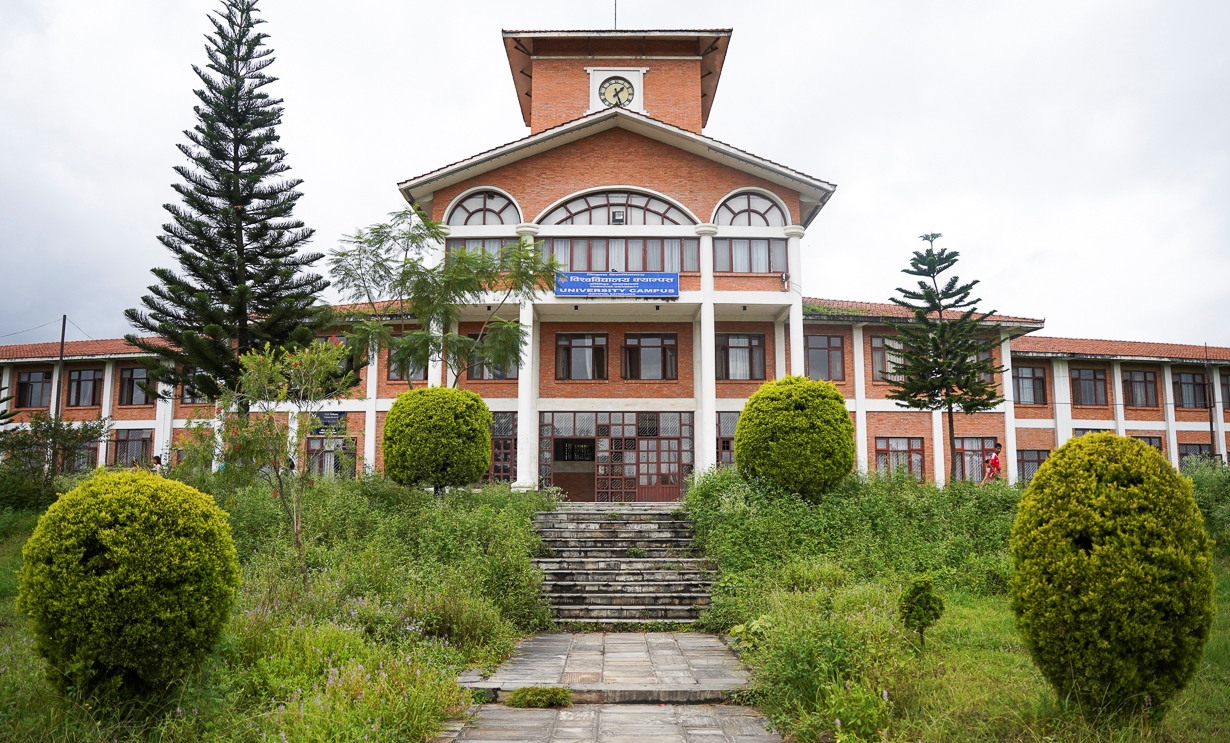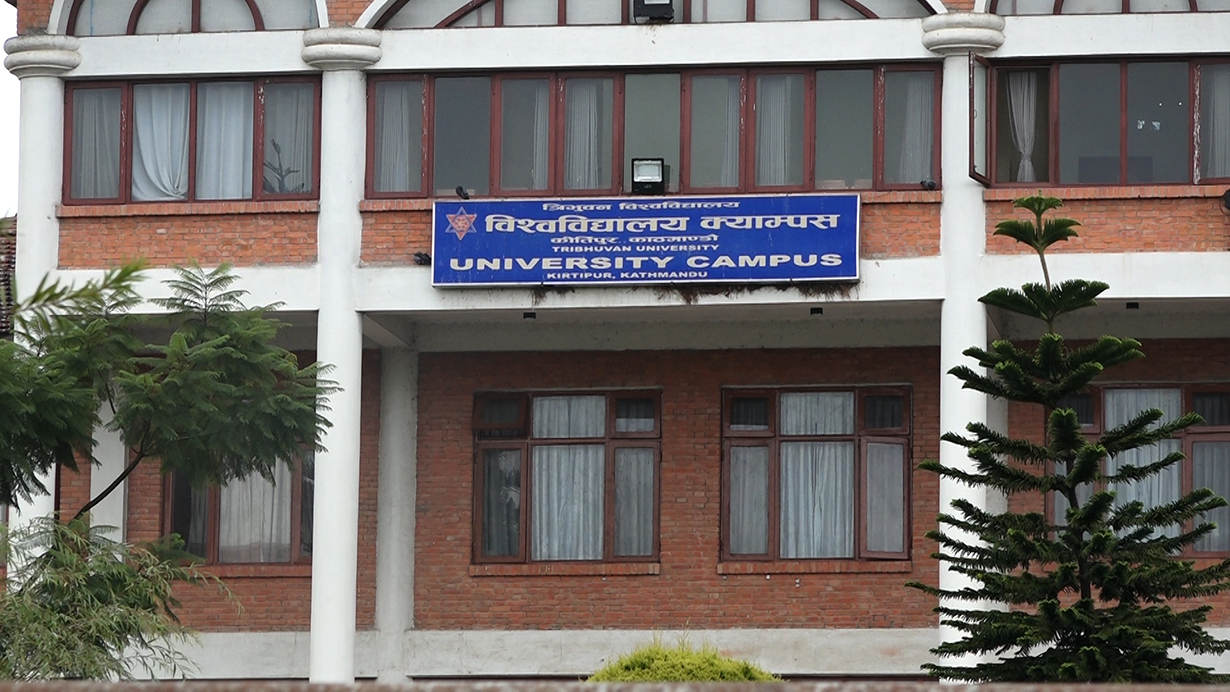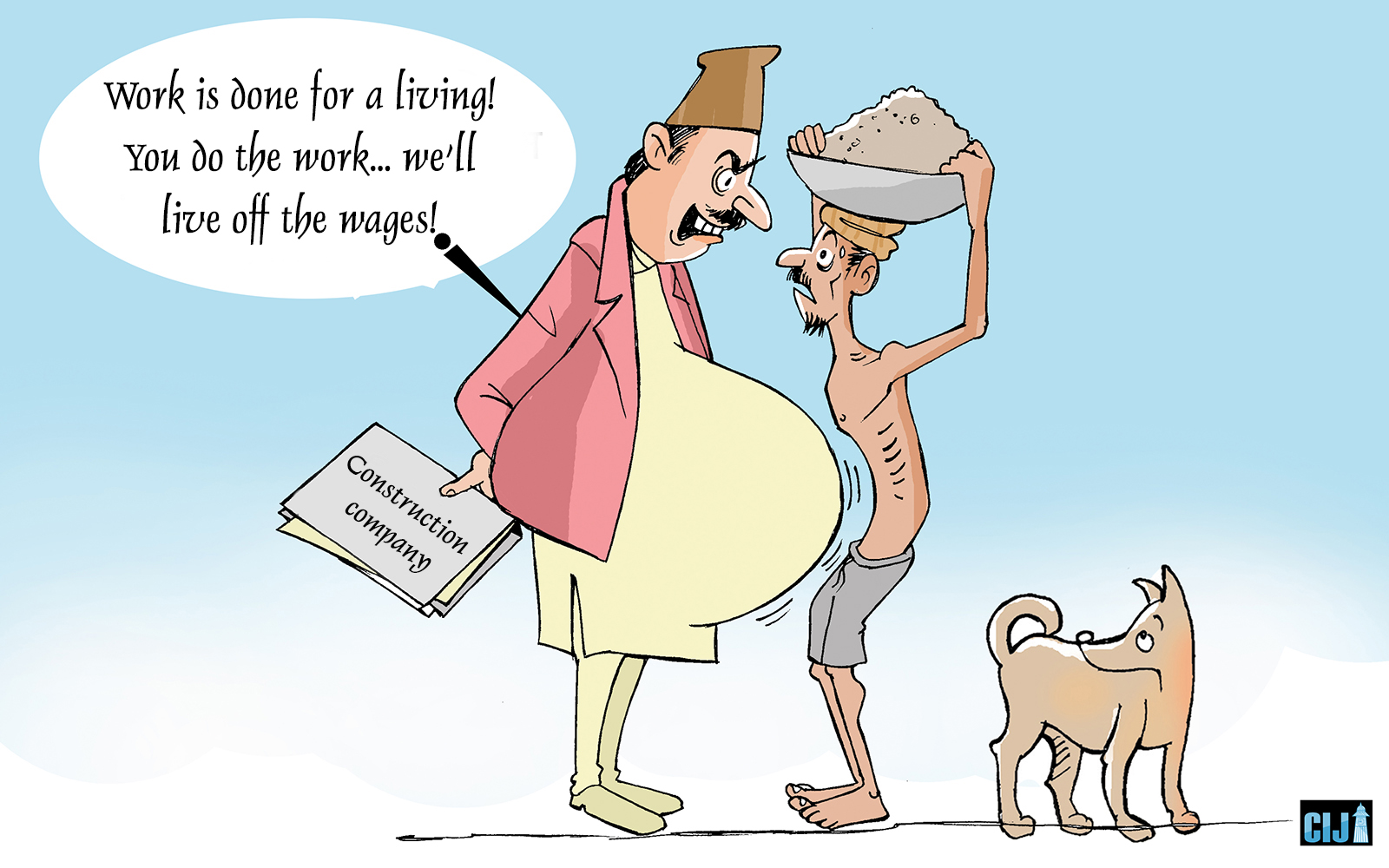The university provides paid study leave for lecturers, aiming it helps upgrade their skills. But this provision has been grossly abused as many such lecturers do not return to work after their study period.
Dinesh Gautam | CIJ Nepal
On 29 July, 2017, Mitramani Subedi, an assistant professor at the Tribhuvan University-affiliated Prithvinarayan Campus in Pokhara, took a study leave for his PhD. He had to return to university service after five years. But on 31 July, 2022, after his leave expired, he submitted his resignation instead.
The campus refused to accept his resignation, saying Subedi has ‘abused his study leave’. But using his connections, Subedi got his resignation endorsed from campus executive committee on 29 January, 2024.
“He had to return to work after the leave but he instead went to the US,” Prof Dr Saroj Koirala, the campus chief, said. “The campus didn’t accept his resignation as he abused the leave but he got it endorsed from the higher-ups.”
The clause 30 of TU’s ‘Teacher Staff Service Rules 2050’ states that teachers who have used three-five years of study leave should return and provide service for at least five years. If the teacher has used three years of study leave, they have to return and work for three years. But assistant professor Subedi flouted this rule.

While endorsing such a leave, the coordination department of the Rector’s Office signs a promise paper with the teacher. The signing also involves a witness.
If the teacher doesn’t return to work after study leave, they have to pay back the salary they received during the leave with 10 percent interest. The TU has imposed a 12 percent interest in such conditions since 2080 BS. But, according to the university sources, Subedi hasn’t returned that sum amounting to about Rs2.5 million.
“The TU officebearers had endorsed his resignation after Subedi promised he’d payback the salary but he hasn’t done so yet,” Koirala, the campus chief, said. “One can’t run away with the state’s money. This is treason.”
Ironically, however, on Asoj 2081 BS, Subedi had sent his son to demand his perks from the university. It appeared that he would receive Rs350,000 as perks but he had still to pay Rs2.5 million. Upon knowing this, Subedi’s son had left the university office, saying he’d discuss the matter with his father.
This is not just an instance; rather, it’s been a trend in the TU. Officebearers concede that there’s been massive abuse of the study leave provision. “More than an abuse, this is a criminal offence,” said Dr Khadga KC, Rector and professor at the TU’s Department of International Relations and Diplomacy. “This is a betrayal against the institution and the nation.”
Let’s take a look at another case. On 1 February 2004, Pavitra Shakya, an assistant professor at the central department of physics, took a study leave for three years. Once her leave was approved, she flew to the UK for study. Over 20 years later, Shakya still hasn’t returned to work.
On 27 October 2014, the central department mailed her asking to attend the office. But Shakya, who is currently in London, refuses that the department ever mailed her. “I had been to the office to submit my resignation when I was in Nepal but it went unaddressed,” she said. “And I haven’t received any such mail yet.”
Shakya added that she has now forgotten even the resignation process. She has also forgotten the salary and stipend she received during her study leave. “I don’t know about the rule to return the salary or the promise paper,” she said.
The clause 84 of ‘Teacher Staff Service Rule 2050’ states that if a teacher doesn’t attend the office for 90 days, the university can sack them. But it hasn’t yet taken action against Shakya, who has been absent for over 20 years.
Professor Krishna Khanal blames TU for the trend, which is on the rise. “They sign the promise paper but do not follow up on that,” Khanal said. “The university should know where, how and which university the teacher is attending. It should filter out candidates.”
The university should regularly alert the teachers once their leave is over, Khanal added. “The university should keep a record of the teachers and follow up on them,” he said. “It can also correspond with the foreign university where the teacher is attending.”
Shambhu Paudel, an assistant professor at TU’s Institution of Forestry in Pokhara, went to the US for his PhD in Water Management on a scholarship. He took a study leave on 16 January, 2018 and tendered his resignation without returning. As a rule, he had to return and work in Nepal for three years. But he, too, like many of his predecessors flouted that rule.
He, however, agreed to return the salary and perks—a total of Rs 4.4 million 83 thousand—he had taken during the leave. But he has not an ounce of regret for flouting the rule.
“I have returned the salary I had taken with 10 percent interest, so I won’t return to work now,” he said. When asked why he didn’t return to work even as he had gone to study with TU’s help, he said, “There’s no job guarantee in Nepal. I decided to stay here as I saw no future in Nepal.”
Professor Khanal says that tendency like this has undermined the trust many put in teachers. “Many would perceive that those who are in the teaching business are reliable and have good character, but that perception has been deteriorated now,” Khanal said.
Disturbance in teaching-learning
As the teachers haven’t returned, the teaching-learning process in central campuses and departments has been affected. The Pulchowk Campus has been hit the hardest. Of the 19 teachers who took a leave in the late 80s, only two have returned and that has affected the campus financially as well, says campus chief Indra Acharya.
“The teachers went to the US and Canada and the campus is bearing the brunt,” he said. “We had to hire other teachers on contract basis. It has cost us financially and hampered the quality of education as well.” The teachers who haven’t returned had gone as part of engineering education project, according to Acharya. “That they have taken benefits from the TU and haven’t return is a crime,” Acharya said.

Many teachers from the TU’s Forestry Institute in Pokhara haven’t returned from their study leave either. The campus’s assistant chief Suman Bhattarai says that teachers who had gone for study leave with their families haven’t returned. “They didn’t return and the promotion process was not regular either. But since the campus had sent them, they should have returned,” he said.
As the teachers who have gone for study leave haven’t returned, the TU faces a compulsion to hire teachers on contract and part-time positions. Only teachers who are in permanent positions and are below the age of 50 get study leave. Having to pay teachers on contract and part-time positions has added financial burden to the TU, officials say.
“When permanent teachers go for study leave for five years, we have had to hire other teachers. That’s why the number of part-time teachers is on the rise,” Dr Dharmakanta Baskota, a former vice-chancellor of TU, said.
Not only that, the phenomenon has also affected educational quality at the university. “The permanent teachers are adequately trained but the part-time and contract teachers are not,” Baskota said. “That has deteriorated the quality of education.”
‘A betrayal to the university’
The number of teachers who do not return after going on study leave is large. According to data from TU, as many as 893 teachers have taken study leave in 10 years between 2070 BS and 2080 BS. The university, however, doesn’t have a record of how many of them have returned after leave.
In the ten years, the TU has had to pay Rs 1 billion 760 million as salary to teachers on leave. But this is calculated based only on basic salary. Most of those who have gone for study leaves are assistant professors.
After the TU was unable to provide details on the salary paid out to the teachers on leave, the CIJ calculated the amount based on basic salaries.
Through details from offices of the Rector, Registrar, the Dean, central department and other few campuses, the CIJ found out that 55 teachers haven’t returned from study leave abroad. But officials say the number might be multiple times higher.
The TU also doesn’t have a record of how much amount it stands to receive from those teachers. Upon learning from respective campuses of those teachers, CIJ found out that most of them had stayed on leave for full five years. And by that account, the TU stands to gain Rs 80 million from the 55 teachers alone.
Officials said that in addition to the salaries they receive from TU while on study leave, they also work on the side and stay in those developed countries. That’s why, questions have been raised of late about the provision to pay the salaries of teachers on study leave.
Another former vice-chancellor of TU Kedar Bhakta Mathema dubs this tendency as outright corruption. “This is a betrayal of huge proportion against the TU, it’s a corruption on the teachers’ part,” he says. “The leadership should immediately spring into action against this crime.”
TU’s office bearers say that there is a need to reevaluate the provision to pay salary to those on study leave. “It has raised financial burden on the univerity,” KC, the Rector, said. “It’s time this provision be brutally reevaluated.”
Prof Dr Shivalal Bhusal, a former Rector of TU, said that the university should force the defaulting teachers to pay what they owe anyhow.
“The leave provision was introduced so the teachers could have a PhD. Previously, teachers wouldn’t be interested even when they would get the facilities,” Bhusal said. “But now the number of teachers going for study leave abroad has increased and so has the cases of abusing this provision.”
According to the rule, a teacher gets paid leave for three years in the beginning. And they have to renew the leave for each successive year with the supervisor’s recommendation.
Number of those who return the money is low
There are teachers who have returned as per the promise paper and have paid back the salaries after they couldn’t do work for full term. There are also those who have overstayed the leave and have paid the salaries after they didn’t teach for the required duration upon returning. There are 27 of these teachers who have returned their salaries. Records show that TU has received Rs 13.6 million from these teachers.
Among those who have returned the money is Dr Dilip Subba, former vice-chancellor of Nepal Academy of Science and Technology. Subba, who was a professor at TU’s Dharan-based technology campus before he became the vice-chancellor, has returned a total of Rs 55020 because he overstayed the leave.

Likewise, Prem Phyak, assistant professor at the education department, returned to the TU after study leave and paid Rs 567,698 after he didn’t work for a year and four months after his leave was over. Phyak has since resigned and currently teaches at Teachers’ College in Columbia University.
“I returned to Nepal after my leave was over but I had to teach for some time. After I tendered my resignation, I paid back my salary on leave as per the promise paper,” Phyak said. “The honest teachers return the money back. Resignation is a regular process. Professors can go wherever they please. I left TU as the work environment was not good.”
Meanwhile, the Institute of Engineering at Pashchimanchal Campus in Pokhara has also received money from teachers who have abused the study leave provision. The campus is at the forefront on doing so, having returned money from six teachers.
“After they receive salary from taxpayer’s money, teachers should be honest to the state and the institution,” Nirmal Prasad Baral, the Paschimanchal Campus’s chief, said. “We have collected money from teachers who haven’t returned as per the promise paper.”
‘Call the teachers who have taken taxpayers’ money back’
Most of the teachers who take study leave tend to go to developed countries like the US, Australia and Canada. Some go on scholarships while others go with their own expenses. Many are found to have taken the PR of those countries after the leave is over. But the TU doesn’t have a record of their number.
The central department and campus chiefs are fed up with the teachers who have stayed abroad. Chiefs complain that the teachers do not return even after repeated calls, messages and formal letters. Instead, they tend to pressure the chiefs to add their leave time and to not sack them.
“We even get calls from the President’s and the Prime Minister’s offices,” Baskota said. “Do we only have to look at the situation of the teachers? Who would look at the situation of the the university?” After their leave time is not added, many teachers resign and their number is on the rise.
Mathema shares a similar experience. A woman teacher had reached Mathema’s office for leave. He endorsed the leave after she promised she’d be back after her leave is over. But she didn’t return.
“I had asked her to look me eye-to-eye and promise she’d be back,” Mathema said. “After she promised she’d be back, I endorsed her leave. But she didn’t return from the UK, where she’d been. Later, I returned the salary amount she had taken while on leave.”
Mathema says that it is possible to collect the amount from them. “We can report them after finding out their place of stay,” he said. “TU should write a letter to the authorities at those countries.”
Registrar Prof Dr Kedar Prasad Rijal says, “One can’t run away with the money of a poor nation. They should return as per promise paper. They can’t run away and resign.”
Rijal adds, “Now onwards, we will write a letter to the authorities of those countries. We will also forward the process to cancel their visas coordinating with the ministries of home and foreign affairs.
TU lacks a record
Even though Prof Dr Rijal sounds committed to bring the teachers on leave back, TU doesn’t have a record on who have completed their PhD or not and who have returned or not. It has also been found that some teachers who went abroad on a study leave for PhD have returned without completing their studies. Assistant professor at public administration central department Keshab Raj Pandey had gone to Norway for a PhD on a scholarship in 2064 BS. But he returned after four months.
Pandey admits that he didn’t complete his PhD. The rule of salary payback applies to even those teachers who return without completing their studies. “Yes, I received my salary on my account but it is more of a concern for the university, it should look into it,” Pandey said. “I returned because there was some problem with the project through which I had gone to the country.”
Yashoda Kafle, from the same department as Pandey, had also taken a study leave on 2067 BS. But TU doesn’t have a record of whether she actually completed her PhD. Kafle, a former department chief, is already retired now. She claims that she did complete her PhD.
Likewise, Deukaji Gurung, an assistant professor at Thapathali Campus, took a study leave on 18 November, 2018. But he didn’t complete his PhD. “I couldn’t complete my PhD due to the Covid pandemic,” Gurung said. “I needed to pay back my salary during the period. And I have done so, adjusting it through leaves on various headings.”
The TU is so negligent about the issue that it has listed those teachers who have returned to work from study leave on the heading of ‘status not known’. Jagadish Bhattarai, who is with the TU’s central department of chemistry, has been listed on the heading of ‘status not known whether present after leave’. He had taken a study leave for his PhD on 5 July, 2007.
But he has already become the chief of the department after returning to work from study leave. TU, however, is still ignorant about his status. The CIJ met him at his office. “I returned to work upon completing my studies and I am now the chief of the department,” he said.
Likewise, Dinesh Pathak, chief of the TU’s Central Department of Geology, also returned to work upon completing his study leave. But the TU’s record also lists him under the heading of ‘status unknown’. “I returned to work after completing my PhD,” he said. “I wonder why I am listed under the heading of ‘status unknown’.”
Khagendra Ojha, an assistant professor at Shankardev Campus, took a study leave from TU on 1 January, 2003. He returned to work after his studies and resigned after a year. He had to serve for three more years. He returned the salary amount for the rest of the years and resigned from TU. But he is still listed under the heading of ‘status unknown’. The heading currently has 21 names who have returned to work from their study leaves.
“We can update the records,” Rector KC said. “This is a shortcoming on TU’s part. We will improve on this.”
Now experts have reached to the conclusion that the provision to provide salaries and perks to teachers on study leave is in itself wrong. TU’s office bearers themselves say that the provision needs amending as it has been abused due to lax regulation.
“Study leave should not span more than three years,” former rector Bhusal said. “The promise paper should be effectively implemented. If required the provision should be amended.”



